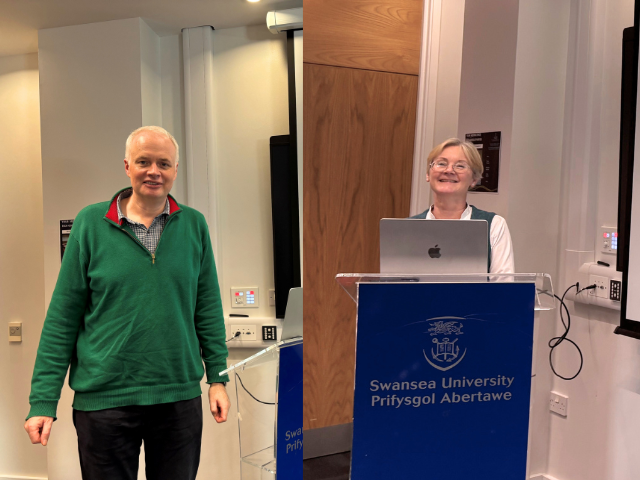
Wales Kidney Research Unit sets out five-year strategy at annual meeting
29 October
The Wales Kidney Research Unit (WKRU) brought together researchers, clinicians and partners from across the country to celebrate achievements and present its new five-year strategy to advance kidney research and patient care across Wales.
Speaking at its annual meeting in October, Professor Donald Fraser, Director of the Wales Kidney Research Unit, said the unit was first established and funded by Health and Care Research Wales in 2015. He added that the renewed funding marks an exciting new chapter for kidney research in Wales.
Professor Fraser said: “Our priorities for the next five years are shaped by conversations we’ve had with our stakeholders over the past decade. Researchers, clinicians, patients, families, carers and commissioners have all helped to define where we go next.”
Professor Fraser outlined how the unit’s work spans three university centres: Bangor, Swansea and Cardiff, each contributing unique expertise.
At Bangor University, Professor Jane Noyes and her team lead health and social care research, including international collaborations reviewing Wales’s opt-out organ donation law, now ten years old.
At Swansea University, Dr Luke Davies is bringing together researchers studying how the body’s metabolism influences kidney health, helping to position Wales at the forefront of this growing field.
At Cardiff University, teams are developing new laboratory techniques to understand kidney disease at the cellular level. Their large-scale, data-driven studies are revealing how cells behave and respond to treatment, providing insights that could shape future therapies.
Professor Fraser also highlighted a surge in clinical trial activity across Wales. He continued: “We’re seeing major success stories. For example, Swansea recently ranked as the UK’s top centre for recruiting participants to a national kidney study. And we’re expanding that success through the Voluntary Scheme for Branded Medicines Pricing, Access and Growth (VPAG), which is helping to strengthen clinical trials activity across Wales.”
The field of kidney research is experiencing what Professor Fraser described as “a renaissance in clinical trial activity”. He said:
Ten years ago, pharmaceutical companies saw kidney disease as too difficult to treat. Now, with new treatments proving so effective, they’re investing again. It’s a very positive time.”
Translating research into real-world benefit
Professor Siân Griffin, Health and Care Research Wales Specialty Lead for Kidney and Urinary Tract Disorders, spoke about how research is already changing lives.
She said: “Our clinical trials portfolio has grown significantly, especially with support from VPAG funding. We’re focusing on slowing kidney disease, tackling specific causes and improving transplantation outcomes.”
Professor Griffin emphasised that the commitment to equity of access is being driven through close collaboration between kidney specialists, primary care teams and pharmacists.
She added: “The treatments tested here in Wales are now reaching patients across the UK, even at earlier stages of disease. It’s about making sure every patient who could benefit actually gets access.”
With the continued support of VPAG, Professor Griffin said the unit is strengthening research capacity by creating new roles, including a research registrar, additional nurses, a research officer and dedicated pharmacist sessions. These posts are designed to improve trial recruitment and expand opportunities for patients to take part in studies.
Reflecting on the progress made, Professor Griffin spoke about a patient diagnosed with kidney disease 60 years ago, before specialist kidney care existed in Wales. The patient’s experience captures how far specialist care, treatment and support have advanced. Professor Griffin said:
To see how far we’ve come, from no specialist care to advanced therapies and active patient involvement, is truly remarkable.”
Keep up to date with the work of the Wales Kidney Research Unit by signing up to our newsletter.